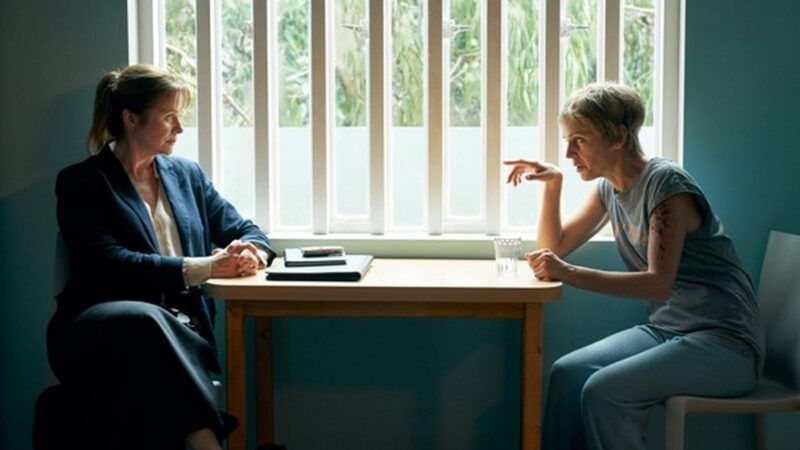AMC, Amazon Offer Up Television Adaptations of Two Hot Books
Too Close and The Underground Railroad provide wildly different experiences.

- Too Close. Available May 20 on AMC+.
- The Underground Railroad. Available now on Amazon Prime Video.
I don't belong to any book clubs. But all my friends who do are constantly confiding that the other members force them to read drooling-imbecile crap that isn't even fit for feeding to swine. Worse yet, there are no Cliffs Notes available for most modern popular literature. You just have to jab yourself in the eye a few times with a fork for distraction, then slog onward.
This week, however, there's good news for everybody stuck in the book-club gulag. Television has thoughtfully adapted two popular club-lit novels, enabling you lounge around on the couch like a slug for a few hours, a bottle of Boodles hooked to an IV needle in your arm, while you just listen closely enough to pick up a couple of names of characters, enough to throw the Did You Really Read It? Gestapo off your tracks.
Actually, you may even want to pay attention to Too Close, which in summary form sounds like IQ-cancelling chick-lit but is really highly entertaining. I've not read the novel, by Natalie Daniels (the nom-de-word-processer of Brit actress Clara Salaman, who also wrote the screenplay), but this three-episode miniseries—full of unsettling erotic cross-currents and character kinks—is absorbing stuff.
The title of Too Close refers to the relationship between a young mother who deliberately drove herself and two children off a bridge, nearly killing everyone in her car, and the forensic psychiatrist who's investigating her fitness to stand trial.
The younger woman, Connie Mortensen (Denise Gough, Guerrilla), has been dubbed the Yummy Mummy Monster by the London tabloids, a reference to her pre-accident svelte blonde look. After the wreck, her scarred appearance runs more toward the Bride of Frankenstein, and she claims to have lost her memory along with her looks. But whether she's genuinely amnesiac or just faking it to stay out of jail, Connie's incandescent rage at whatever went off the rails in her life is still there, along with a startlingly canny insight into the darker nooks and crannies of the minds of others.
The shrink, Emma Robertson (Emily Watson, Chernobyl), is frumpily middle-aged, with a failing marriage and career. The latter, she hopes, may be saved by her work on the Yummy Mummy case. Her sessions with Connie turn into mutual cat-and-mouse manipulations that have little to do with what happened out there on the bridge. Emma is convinced that Connie's life was knocked for a loop by the presence of a sexy lesbian neighbor. Connie demurs ("I like cock!" she shouts), countering that Emma is merely projecting her own fears of a dwindling sex life that's been reduced to "the once-a-month duty fuck." As their sparring escalates, it becomes more and more difficult to figure out who is more disturbed. "I'm not the one who drove a car into the river!" snaps Emma. Retorts Connie: "No, but you've wanted to." The silence that follows is deathly chill.
There are plenty of intriguing subplots and red herrings in Too Close, but what drives the engine is the full-speed collision of two cracked psyches, expertly played. The sly Watson can convey an entire novel's worth of story with a single look. (When her husband reprovingly asks, during a phone conversation, if she's smoking again, she lifts a concealed cigarette and breezily answers "no" as she puffs away.) And Gough is practically playing two roles, the flirty and disturbed pre-accident housewife and the post-accident ranting nutjob asylum inmate. Too Close is the sort of thing that, if repeated often enough, could give chick-lit a good name.
Then there's the week's other literary entry, The Underground Railroad, an adaptation of Colson Whitehead's 2016 novel of the same name, directed and largely written by Barry Jenkins, who directed the Oscar-winning Moonlight. I've not read the novel, which won a Pulitzer. (But then, so did Hemingway's The Old Man and The Sea, a novel set in Cuba that was the second-worst thing ever to happen to the island after Fidel Castro.) But I can't imagine it's anywhere near as awful as this 10-episode TV production.
A sci-fi fantasy vision of slavery and race relations, the TV version of The Underground Railroad is an incoherent mess of artistic pretension, full of scenes that are not under-lit but un-lit, nonsensical soliloquys with neither symbolic nor literal value (why would a slave recite lines from Gulliver's Travels to a young woman just beaten nearly to death by the plantation owner?) and surreal flashbacks that only further trash what is a very tentative narrative.
The Underground Railroad, so far as I could tell, stars South African actress Thuso Mbedu as a runaway slave named Cora who escapes a Georgia plantation where the owner burns slaves alive and whips them to death for the entertainment of his dinner guests. (Subtlety is not in Jenkins' toolbox.) Cora manages to hook up with the Underground Railroad, which in real life was a network of trails and safehouses that helped escaped slaves reach free states. Here, it's not only an actual train running through tunnels all over the South, but traveling across time itself. Cora visits all kinds of alt-history versions of black existence, none much better (and some much worse) than the genocidal plantation where she started. "Just look outside," the conductor encourages her. "You'll see the true face of America." Or at least the Woke version.


Show Comments (11)